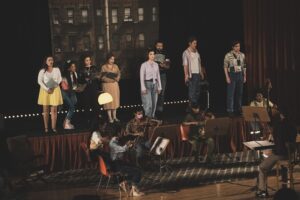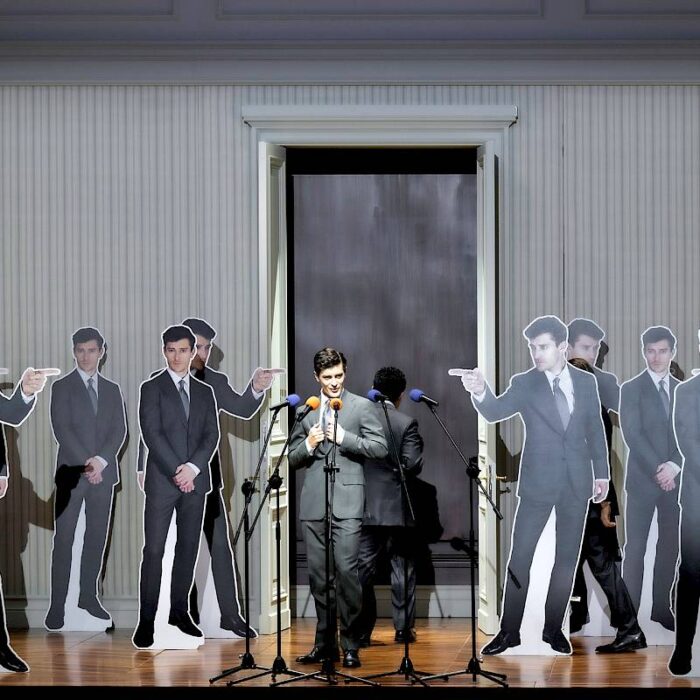
Opéra National de Paris Atelier 2022-23 Review: Looking for Bernstein
By João Marcos Copertino(Photo Credit: Vincent Lappartient)
In “Looking for Bernstein,” Victoria Sitjà kills two birds with one stone. She attempts to fix the problem of arbitrary repertoire choices in academic recitals and deal with the extremely complex legacy of Leonard Bernstein.
Bernstein is a sui generis figure in the music world. An innate communicator, Lenny moved between the small screen of the TV and the podiums of American orchestras. His personality, his charisma, and handsomeness are unique. Moreover, his talent as a composer, though not universally admired, also distinguishes him from all the other star conductors of the last century. Richard Strauss and Bruno Walter conducted and composed, but today they are known for only one of these activities each. Bernstein is both Lydia Tár’s mentor and the fella who composed “I feel pretty.” Bernstein is also Lenny (just imagine calling Karajan “Herb”), the kid from Brookline who happened to be an American genius, an American erudition utopia.
Sitjà wisely made her dramaturgy explore both Bernstein the composer and the conductor by having the singers and actors sing pieces that shaped our understanding of Bernstein. The main aspect that links together these two parts of a life is Bernstein’s “Lenny-ness.” The production conveyed an idealized memory of the conductor’s charisma and his capacity to convey an unpretentious and infectious joy in music when he talked.
“Looking for Bernstein,” not “Waiting for Beckett,” has a clever plot. The singers play versions of themselves in 1990, weeks before Bernstein’s passing, as they prepare a recital for the American maestro. In this process, their own lives change. As their drama unfolds, we see videos and fragments of Bernstein’s interviews and rehearsals. The music was efficiently adapted for a competent ensemble that will play music ranging from Bach to Mahler. The costumes are impeccably selected for peak 90s nostalgia.
Asking singers, especially young singers, to act is always a risk. Having them act out fictionalized versions of themselves is even riskier. Such a decision makes evident that an artist can be an amazing performer without thereby being thespians. Playing a version of oneself is, in my view, harder than simulating a well-constructed Tristan, Aida, Violetta, or Basilio. The results are mixed. Some singers are better than others at transmitting a compelling version of their own personas on stage. Moreover, the presence of Antoine Feron, a professional actor, portraying the production’s director instead of enabling the singers, only made their acting seem more fragile.
Not less important, “Looking for Bernstein” is straighter than Bernstein himself. There is, indeed, a very nice lesbian marriage proposal by a sympathetic and drama-free lesbian couple that seemed more to check inclusivity boxes than to achieve anything dramaturgically. Besides the obvious problem that marriage licenses were not granted for gay couples in 1990, the lack of the gay male gaze in the show makes evident something essential in Bernstein’s “Lenny-ness.” His homosexuality was a personal drama, but also part of his charisma and panache. While for many, Bernstein was an apparitional gay. Those who sensed this, saw it. While those not inclined to see could easily just ignore it. His sexuality is not detached from his musical persona. His approach to masculinity was never tyrannical, but extremely particular. His New Englander charm that compelled the housewife to tune into Mahler. His insistence on specific types of casting, and his capacity to feel glitter, pretty, and gay cannot be erased. Especially when male homosexuality is ubiquitous in any opera house on stage, off-stage, and in the audience.
One interesting aspect of staging a play with a concert is that the audience is left unsure about whether the music performed is or is not a diegetic fit. That is, for me as an audience member, I might really enjoy it. But did the characters enjoy it too? That was a good coup de theatre for Sitjà, making the watching and listening experience extremely pleasant and intriguing. Audience members always had to question themselves regarding their own tastes and try to make up their minds about “was it good?” I can say that, musically, there were good moments.
Young singers and fresh voices. Paris Opera Atelier has a huge cast of singers and although vocal abilities are not distributed among its members with a socialistic rigor of equality, they all have something special in their own vocal charm.
To me, the best musical moments happened when Margarita Polonskaya was singing. Her rendition of Bernstein’s “Piccolo Serenata” was the incorporation of the workaholic soprano who stretches while warming up and then teases the audience with her talent. The choice to sing Brahms’ “Von Ewiger Liebe” might have been a bit strange dramaturgically speaking. But, for L*rd’s sake, that is such a beautiful Lied! Polonskaya has a generous voice and even though she sang away from the piano, she gave a very mature interpretation of it.
Laurence Kilsby is the romantic central lead of the play. He belts out Tony’s “Something is coming” and “Tonight” with enthusiasm, but not with so much voice. Nevertheless, when he starts singing Mozart’s “Requiem,” his musicianship begins to flourish.
Sarah Shine sings Maria with a transatlantic accent, but preserves the lyric charm that made the character singable for Rachel Zeigler, Julie Andrews, and Kiri Te Kanawa. Her best moment is her rendition of the beautiful and inexplicably underrated Verdi aria, “Sul fil d’un soffio etesio,” from Falstaff. The small ensemble and Shine’s candidness gave to Nanetta’s aria a sort of Mozartian charm that is not often found in Verdi’s interpreters.
Seray Pinar sings a somewhat fast, but spirited version of Bach’s “Erbarme dich” in the most thankless of translations. (“Have Mercy, Lord, on me” indeed). Her doing so made one feel the many ways that Bernstein’s approach to baroque repertoire could have stood being historicized, but still it conveyed something vibrant in its own way.
Alexandre York sings the Toreador’s aria and a fragment of Mahler’s second symphony, with the charming Lisa Nougier. Both moments work extremely well dramaturgically, though the singer seemed a bit less inspired than usual. His voice was opaque and struggled more than a bit with intonation.
Nougier also sings a correct version of “Si mi chiamano Mimi.” It is an interesting choice given that Bernstein’s recording of the opera, with Angelina Réaux and Jerry Hardley as the leads, is no one’s favorite. It may be just too American.
Adrien Mathonat has an extremely generous voice. His character is responsible for what might be the most outrageous moments in the play. He stresses how little he likes English as a language and Bernstein as a composer, all complaints that we have heard more than once in Paris, Brazil and even in the United States. It was interesting to hear some ambivalence about Bernstein’s legacy. This prevented the play from being solely panegyric. Musically, I would have liked to hear more of Mathonat’s voice in more pieces. It is certainly big and works well in Ochs’s Waltz. Though much of the charm came from Polonskaya’s interventions.
Finally, Ramon Theobald conducts an efficient group of musicians that have to perform and act with their mouth mostly shut.
All in all, it is very good to spend a couple of hours reflecting upon a musician’s legacy and hear the voices of the future.


